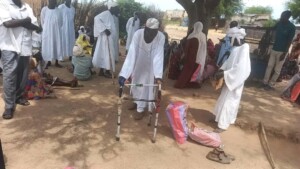No improvement in ‘watery diarrhoea’ numbers in Central Darfur
An activist reported that the situation of ‘acute watery diarrhoea’ in the area of Nierteti, Central Darfur, has not improved. Eleven people died in a week’s time. Pharmacies in Khartoum remain low on medicines, including psychiatric and kidney medicines.
 Cholera patient in Sudan (file photo)
Cholera patient in Sudan (file photo)
An activist reported that the situation of ‘acute watery diarrhoea’ in the area of Nierteti, Central Darfur, has not improved. Eleven people died in a week’s time. Pharmacies in Khartoum remain low on medicines, including psychiatric and kidney medicines.
The activist, who volunteers in the health services to combat the spread of what is suspected to be cholera, told Radio Dabanga yesterday that the isolation ward in Nierteti Hospital received five more people infected with the disease. “The number of reported cases has run-up to 81.”
He claimed that a number of patients with symptoms of cholera died in the previous days. The medical isolation centre allocated to receive the cases was full, the activist reported to Radio Dabanga earlier this week, with about 65 suspected cases of cholera.
“The disease has spread to about 50 villages east of Niereteti,” according to the activist, claiming that dozens of people have been infected. “They are mostly elderly people who could not move to the isolation centre in the hospital.”
No medical aid is available in these villages to treat the patients and contain the disease, he added.
Medical team
Two people died from similar symptoms of acute watery diarrhoea or cholera in the last week. Five people died on Monday, and four on Tuesday, from similar symptoms. On Sunday the state’s health ministry said to deploy a medical team consisting of ten doctors, eight nurses and medics to Nierteti town and they went on their way to the affected villages.
September 2017 was the last time that Nierteti Hospital was treating more than ten cases of cholera – most of them arrived from the camps for displaced people – at a time when the spread of the epidemic in Sudan seemed to subside.
Medicines in Khartoum
In Khartoum, a number of patients have complained about the lack of psychiatric medicines in pharmacies in the Sudanese capital, in addition to a lack of intravenous and kidney medicines, and the rise of prices of asthma medicines.
Newspapers reported that pharmacists have stressed the importance of these medicines, especially the ones for psychological cases, which might result in social problems for patients.
Last month, a number of pharmacies in Khartoum carried out a six-hour partial strike from work in protest against the unprecedented high prices of medicines (that increased more than 300 per cent this month) and the scarcity of life-saving medicines.
A couple of days later more than 200 pharmacies in Khartoum closed their doors on Sunday in protest against new measures taken by the Medicines and Toxics Council related to the inspection of medicine prices.











 and then
and then